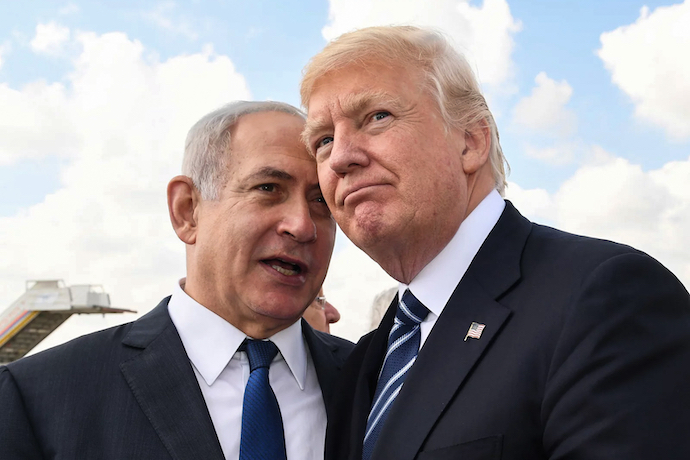
The U.S. Needs to Step Back from Israel
The world is headed towards a multipolar order, but Washington seems to carry on as if American hard power is unlimited and endless. Now, a year after the October 7th Hamas attacks, with Iran’s recent ballistic missile attack and Israel’s invasion of Lebanon, it’s time for the United States to take a step back and take a serious look at how it will respond. American policymakers and voters should consider the long-term effects of America’s unique relationship with Israel and avoid further entangling the United States in Israel and, by extension, Prime Minister Benjamin Netanyahu’s strategic interests.
Rather than analyze patterns of blowback or historical regional shifts, policymakers in Washington and mainstream media sources are regularly short-sighted in their support of Israel. The billions in aid given every year has enabled Israel to act increasingly aggressively towards its neighbors while ignoring any red lines given by the United States. This enablement must be challenged.
The United States did not always have such a close relationship with Israel. The National Intelligence Estimate prepared for incoming President Dwight D. Eisenhower said that the “U.S. association with Israel is a continuing irritant in U.S.-Arab relations and the major obstacle to the acceptance of U.S. influence in the Middle East.” The report continues with, “Moreover, many Arabs believe that U.S. partiality in the Arab-Israeli dispute is further demonstrated by U.S. failure to press more vigorously for enforcement of UN decisions on Arab refugees, on delimitation of the borders of Israel, and on the internationalization of Jerusalem.”

The report concludes, “The U.S. faces the dilemma that Israel cannot survive without foreign aid and that U.S. aid to Israel deepens Arab resentment against the U.S.”
In 1957, President Dwight D. Eisenhower had plans to pressure the United Nations into ending governmental and private assistance to Israel as a way to pressure Israel into exiting the occupied Sinai Peninsula. In May of 1967, the State Department sent a telegram on behalf of President Lyndon B. Johnson, pressuring Israel not to launch a pre-emptive strike on its Arab neighbors.
Moving into the Reagan presidency, Israel’s strategic relationship with the United States started to look like its modern iteration. Richard Perle, Assistant Secretary of Defense for Global Strategic Affairs under Reagan, greatly influenced this new relationship. Perle prepared a strategy document in 1996 for Israeli Prime Minister Benjamin Netanyahu, in what was then Netanyahu’s first stint of many as prime minister. In this document titled “A Clean Break: A New Strategy for Securing the Realm,” he advised that Israel pursue a much more aggressive relationship with its neighbors. This included the suggestion that Israel engage Syria, Hezbollah, and Iran. Rather than seeking peace, Perle suggested that Israel “contain, destabilize, and roll-back” entities which are threats to its security. Additionally, it was advised that a replacement should be found for then-PLO leader Yasser Arafat. This new policy aimed to aggressively seek dominance in the Middle East with significant help from Washington.
This advice has largely been followed, with the consistent support of America. Israel invaded Lebanon in 2006, continued to occupy the Syrian Golan Heights illegally, supported Islamic Brotherhood-connected fighters to oppose Assad’s regime, and pressured the United States to consistently act aggressively towards Iran. Additionally, Netanyahu and members of his Likud party funneled money and resources to Hamas with the explicit goal of creating discord and inconsistent leadership amongst the Palestinians.
This strategy has directly resulted in consistent blowback for Israel to deal with. Instead of seeking peace with all of its neighbors, Israel has consistently sought escalation and retaliation while playing victim.
Israel has every right to defend itself from terrorist groups, but it shouldn’t be surprised when occupation and aggression are proceeded by resistance. For decades, the United States has chosen to be caught up in this cycle of aggression and resistance. Israel has never sent troops to assist America in its operations and has no defense agreement with the United States. Despite this, the nation has received about $310 billion in aid since its founding.

This direct aid is not the whole story either. America has been experiencing regular blowback in the region as well. Perhaps the first large example of this was the Iranian Revolution of 1979. After a couple of decades of consistent support from the puppet government in Iran, youth, socialists, and religious zealots demonstrated violently and eventually took over the U.S. embassy in Tehran. The subsequent hostage crisis and return of Supreme Leader Ruhollah Khomeini would cast a shadow on America’s role in the region moving forward.
After decades of shunning diplomacy with Iran, President Barack Obama began to participate in diplomacy with the Iranian regime. The successful nuclear deal, known as the Joint Comprehensive Plan of Action, placed strict restrictions on Iranian uranium enrichment, with sanction removal in return. Neutral parties confirmed that Iran largely complied with restrictions even while the West did not hold to the deal perfectly. President Donald Trump would disengage from the plan, and the Biden administration followed suit and kept sanctions in place after Israeli pressure. Despite high levels of economic and diplomatic pressure placed on Iran, U.S. Secretary of State Antony Blinken claims that the country is 1-2 weeks away from nuclear breakout.
Trump’s Abraham Accords were an attempt to normalize relations between Israel and some nations which did not formally recognize it. This scheme was an attempt to unify anti-Iranian states. After billions of dollars in aid were promised, Bahrain, the United Arab Emirates, Sudan, and Morocco entered into some level of normalization with Israel. Regional powerhouse Saudi Arabia was in the process of negotiating to sign such an agreement before the October 7th attacks occurred. The subsequent Israeli massacre of civilians in Gaza has delayed the Saudis signing onto the Accords.
The United States has continued to overspend and overextend its global presence. Defense spending is regularly the first or second largest budget item, with fiscal year 2024 defense-related spending hitting $883.7 billion. With the cost of servicing debt hitting roughly $1 trillion, Washington can’t afford to bankroll Israel’s or the world’s security anymore.
This is becoming clear to some. With American policymakers unable to negotiate effectively due to its extreme bias towards Israel, China has stepped in. China hosted successful talks between Iran and Saudi Arabia, significantly increasing regional trade and investment. Meanwhile, the Biden administration has been unable to pressure Israel into a ceasefire agreement with Hamas and has watched from the sidelines as Israel begins a new invasion into southern Lebanon.
Despite a withdrawal from Afghanistan and talks of troop drawdowns in Iraq, the United States will not be able to exit its costly presence in the Middle East until it allows Israel to handle its own national security independently. In response to the Iranian-Israeli conflict, President Biden has sent thousands of U.S. troops to the Middle East, adding to the 40,000 troops already in the region. When Israel invaded Lebanon in 2006, the United States had to evacuate around 15,000 American citizens and pledged $230 million in aid to Lebanon. This type of operation would not have been necessary had President George W. Bush refused to pressure Israel to stand down.
Future U.S. presidents would be wise to follow President George Washington’s advice and avoid “entangling alliances.” With a multipolar world approaching, the United States should pursue peace and diplomacy with as many partners as possible, even if that means ending the billions in aid that Washington sends to Israel every year with little in return.
